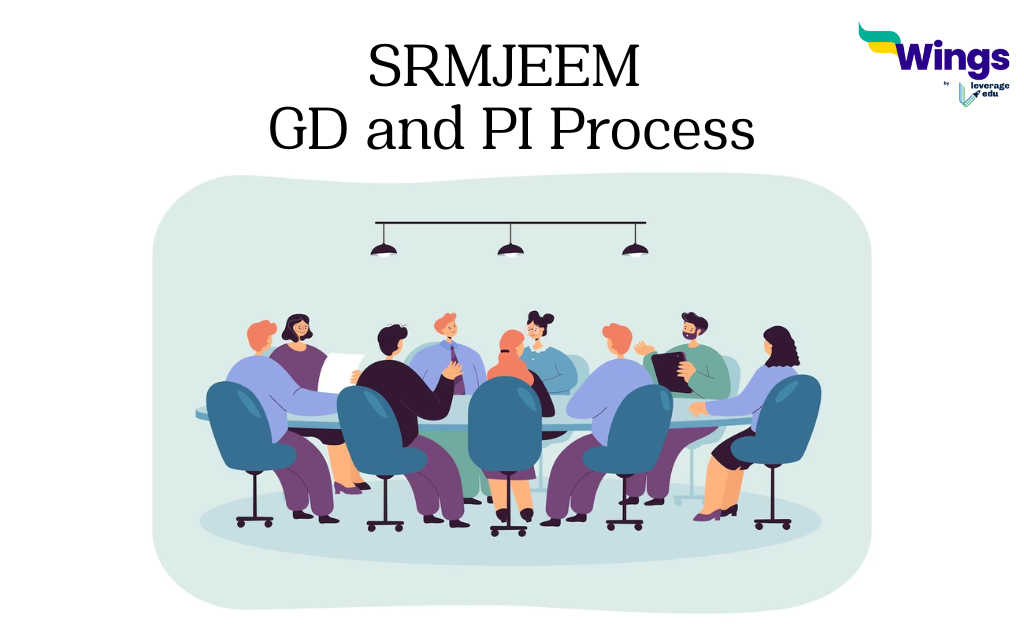SRMJEEM GD PI Process: Sri Ramaswami Memorial Joint Entrance Exam for Management, popularly known as the SRMJEEM is an exam conducted by the Sri Ramaswami Memorial (SRM) University. The exam is conducted in four phases to select eligible and qualified candidates for admission to various MBA programmes at the SRM College of Management. The registration for the SRMJEEM phase 2 has been recently concluded and the registration for phase 3 is expected to begin soon in May 2023.
Based on the scores secured by the applicants and cut-offs released by the SRM university for the SRMJEEM entrance examination, qualifying candidates will be further called for group discussion/case discussion and a personal interview. We shall be discussing the group discussion and personal interview in this blog.
| Name of the Exam | Sri Ramaswami Memorial Joint Entrance Exam for Management (SRMJEEM) |
| Examination Conducting Body | Sri Ramaswami Memorial (SRM) University |
| Level of Exam | University-level entrance exam |
| Mode of Application | Online |
| Mode of Examination | Remote online auto-proctored |
| Duration of the Examination | 2 hours 30 minutes (150 minutes) |
| Type of Question | Multiple choice questions (MCQs) |
| Total Number of Questions | 100 |
| Marking Scheme | +3 for a correct answer No negative marking |
| Language of the Examination | English |
| Official Website | www.srmist.edu.in |
SRMJEEM GD and PI Process
After the SRMJEEM exam is conducted and the results of the same are declared by the SRM University, the university will publish a cut-off. Based on the cut-off, candidates will be further called for the group discussion/case discussion and personal interview.
The schedule for the group discussion and personal interview rounds for the candidates will be released once the SRMJEEM result and cut-off are released. The GD and PI are conducted in multiple sessions for smooth conduct and according to the vacancy of seats.
Group Discussion and Personal Interview
SRMJEEM test-qualified candidates who meet the cut-offs released by SRM University are first called for the group discussion/case discussion round where a group of candidates are given a particular topic to have a healthy and relevant discussion and put forth their views and opinions.
Succeeding candidates are further called for a personal interview with the panel members of SRM University where the candidates have a one-to-one interaction. The members of the panel ask questions and interact with the candidates at a deeper level to check their depth of knowledge.
The group discussion and personal interviews are conducted to assess the candidate’s traits and soft skills for future managerial roles. The group/case discussion and personal interview enable the examination panel to understand the candidate’s communication skills, articulation of thought process, critical thinking and evaluation, general awareness, interaction and leadership abilities, etc.
The candidates are judged and scored solely based on their performance. Only those candidates who qualify for all rounds of the selection process are called for a counselling session wherein the candidates have to get their documents verified and make the admission fee payment of the specified amount to confirm their seat at SRM University.
FAQs
The selection process for admission into various MBA programmes at SRM University includes the SRMJEEM entrance test (other common entrance test scores are also applicable), psychometric test, group discussion/case discussion and personal interview.
The SRMJEEM entrance test is conducted multiple times a year by SRM University. This year the exam will be conducted four times.
Appearing candidates must score at least 60% in the SRMJEEM test to qualify for the next rounds.
Thousands of candidates appear for the SRMJEEM exam to get admitted to various MBA programmes at SRM University. To help the candidates prepare better, we have provided detailed information on the group/case discussion and personal interview process to prepare for these rounds accordingly. We hope candidates find this information helpful and that it helps them in their admission process.
For more such updates, check out our Indian exams page and do not forget to follow us on Instagram, Facebook, Twitter and LinkedIn


 One app for all your study abroad needs
One app for all your study abroad needs












 60,000+ students trusted us with their dreams. Take the first step today!
60,000+ students trusted us with their dreams. Take the first step today!